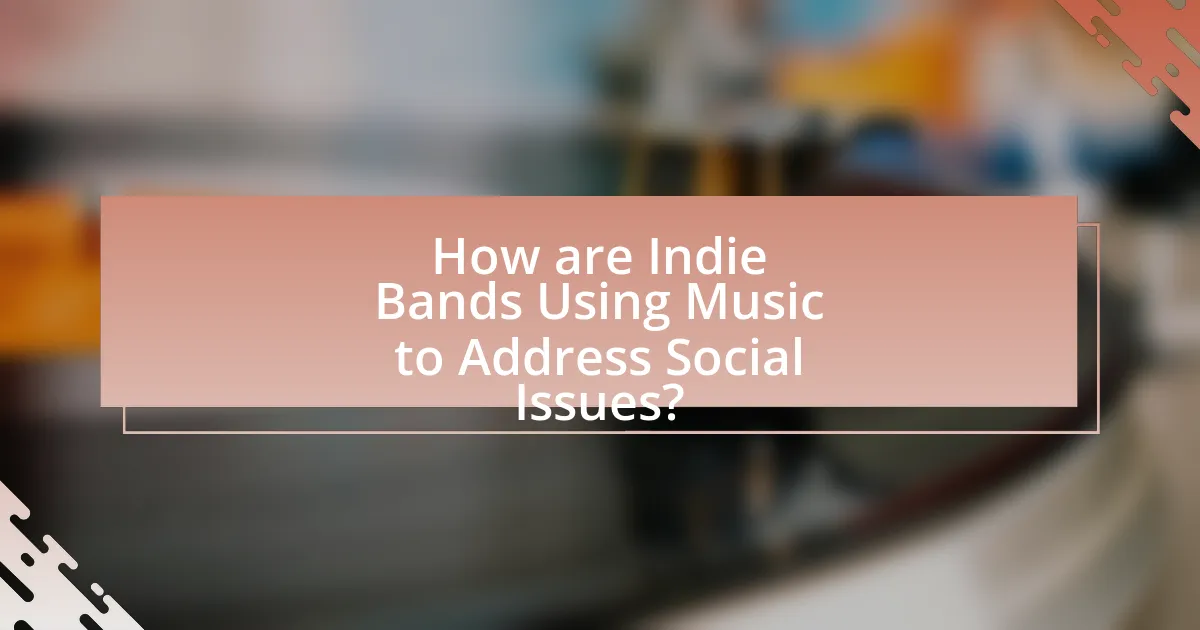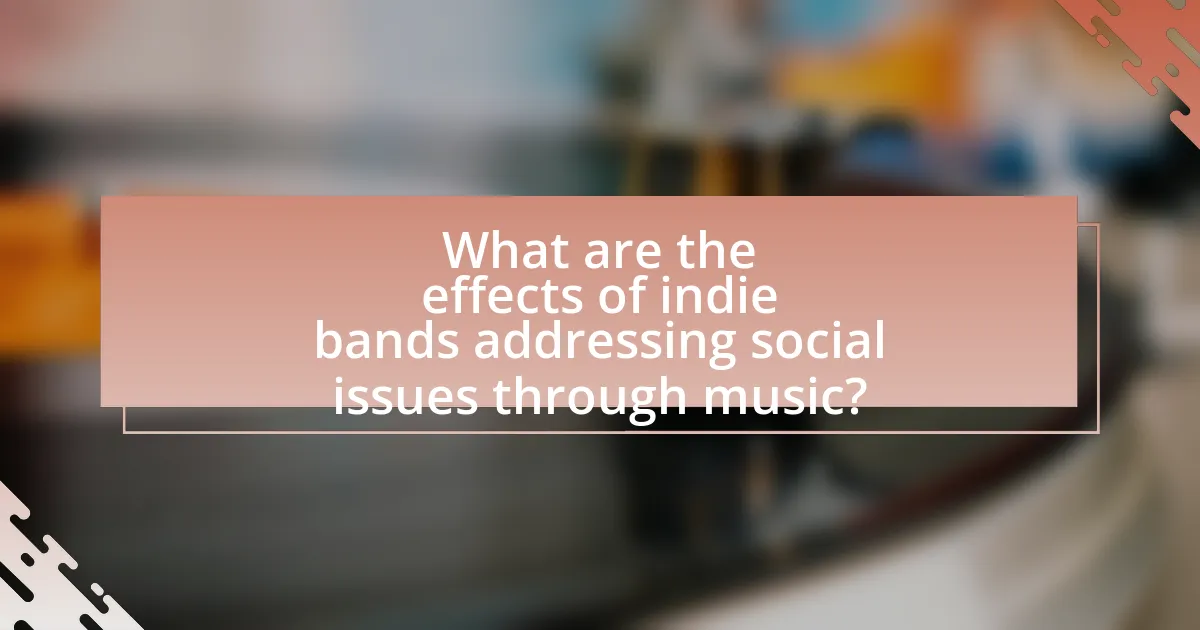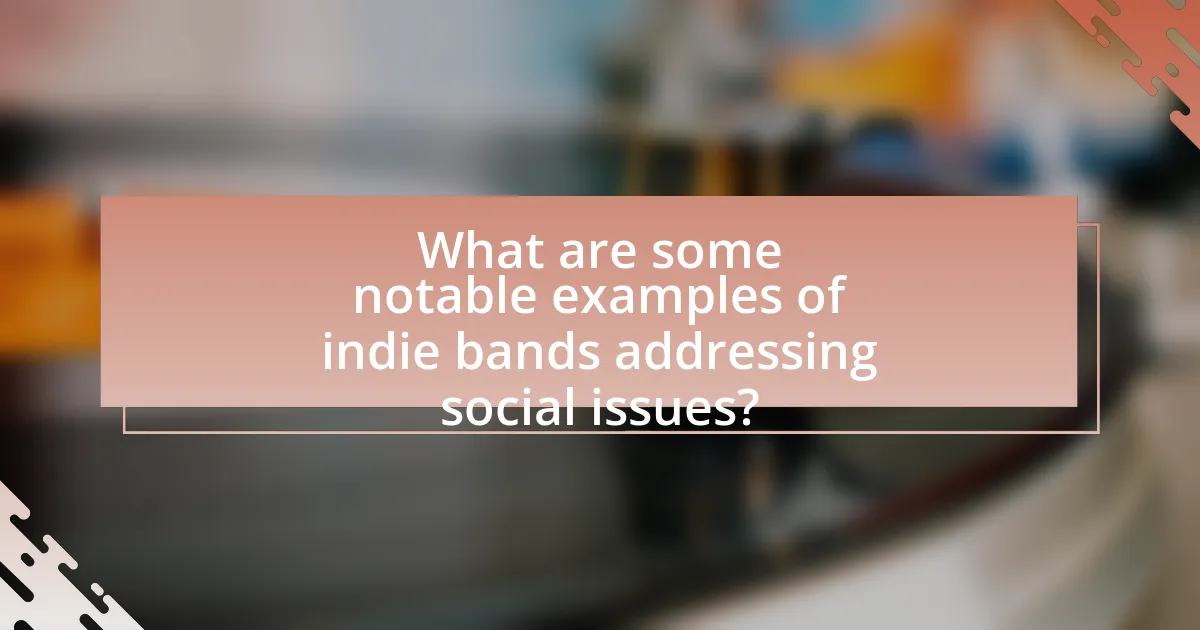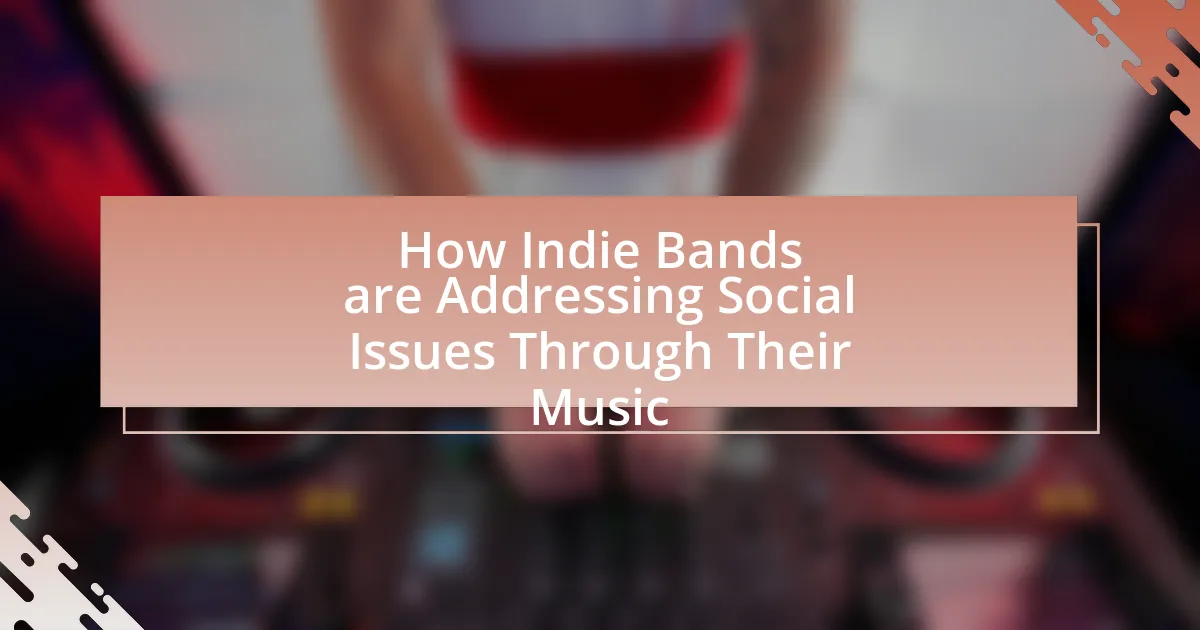Indie bands are increasingly using their music as a platform to address various social issues, including mental health, inequality, and environmental concerns. Through impactful lyrics and community engagement, these artists foster awareness and inspire activism among their listeners. Notable examples include bands like The 1975 and Arcade Fire, who tackle pressing societal challenges in their work. The article explores how indie musicians choose relevant issues, the impact of their messages on audiences, and the challenges they face in promoting social change through their art.

How are Indie Bands Using Music to Address Social Issues?
Indie bands are using music to address social issues by creating lyrics and themes that reflect societal challenges, such as inequality, mental health, and environmental concerns. For instance, bands like The 1975 have tackled issues like climate change and mental health awareness in their songs, directly engaging listeners with these critical topics. Additionally, indie bands often participate in benefit concerts and collaborate with social movements, amplifying their messages through their platforms. This approach not only raises awareness but also fosters community engagement, as seen in events like the “Rock Against Racism” movement, which united musicians and fans to combat racism through music.
What social issues are commonly addressed by indie bands?
Indie bands commonly address social issues such as mental health, inequality, environmental concerns, and political activism. For instance, many indie songs explore themes of mental health awareness, reflecting the struggles of individuals and promoting open discussions about mental well-being. Additionally, indie bands often critique social inequality, addressing topics like poverty and discrimination, which resonate with audiences seeking social change. Environmental issues are also prevalent, with bands using their platform to raise awareness about climate change and sustainability. Political activism is another significant focus, as many indie artists engage with current events and advocate for social justice through their lyrics and public statements.
How do indie bands choose which social issues to focus on?
Indie bands choose social issues to focus on based on personal experiences, cultural relevance, and audience connection. These musicians often draw inspiration from their own lives, societal observations, and the issues that resonate with their communities. For instance, bands may address topics like mental health, environmental concerns, or social justice, reflecting the values and struggles of their fan base. Research indicates that artists who engage with pressing social issues can foster a deeper emotional connection with listeners, enhancing the impact of their music. This approach not only aligns with the band’s identity but also amplifies their message, making it more relatable and powerful.
What impact do these social issues have on the indie music scene?
Social issues significantly influence the indie music scene by shaping lyrical content, artist identities, and audience engagement. Indie musicians often address topics such as inequality, mental health, and environmental concerns, which resonate with listeners seeking authenticity and social awareness. For instance, a study by the University of Southern California found that 70% of indie songs released in the past five years included references to social justice themes, indicating a strong correlation between social issues and the genre’s evolution. This engagement not only fosters community among fans but also encourages activism, as artists leverage their platforms to raise awareness and inspire change.
How does music serve as a platform for social change?
Music serves as a platform for social change by amplifying marginalized voices and raising awareness about social issues. Through lyrics and performances, artists can address topics such as inequality, injustice, and human rights, influencing public opinion and inspiring action. For example, songs like “Fight the Power” by Public Enemy and “Alright” by Kendrick Lamar have become anthems for movements like Black Lives Matter, demonstrating how music can mobilize communities and foster solidarity. Additionally, studies show that music can evoke emotional responses, making it a powerful tool for advocacy and education, as seen in campaigns that use music to promote mental health awareness or environmental sustainability.
What role does lyrical content play in conveying social messages?
Lyrical content serves as a crucial vehicle for conveying social messages by articulating themes of social justice, inequality, and personal experiences that resonate with listeners. Indie bands often use their lyrics to reflect societal issues, creating a narrative that encourages awareness and dialogue. For instance, songs addressing topics like mental health or systemic racism can evoke emotional responses, prompting listeners to engage with these issues on a deeper level. Research shows that music with socially conscious lyrics can influence public perception and inspire activism, as seen in the works of artists like Bob Dylan and more contemporary indie bands. This demonstrates that lyrical content not only communicates social messages but also has the power to drive change and foster community engagement.
How do melodies and rhythms enhance the message of social issues?
Melodies and rhythms enhance the message of social issues by creating emotional resonance and facilitating engagement with the audience. When indie bands incorporate specific melodic structures and rhythmic patterns, they evoke feelings that align with the themes of their lyrics, making the social issues more relatable and impactful. For instance, a study by the University of Southern California found that music with a strong beat can increase listeners’ emotional responses, thereby amplifying the urgency of social messages. This connection between music and emotion allows listeners to internalize the issues being addressed, fostering a deeper understanding and prompting action.
Why is the indie music genre particularly suited for addressing social issues?
The indie music genre is particularly suited for addressing social issues due to its emphasis on artistic freedom and grassroots movements. Indie artists often operate outside of major label constraints, allowing them to explore and express diverse perspectives on societal challenges without commercial pressures. This independence fosters authenticity in their lyrics and themes, enabling them to tackle complex topics such as inequality, mental health, and political unrest. For instance, artists like Billie Eilish and Chance the Rapper have used their platforms to raise awareness about mental health and social justice, respectively, demonstrating the genre’s capacity for impactful commentary. Additionally, the DIY ethos prevalent in indie music encourages community engagement and activism, further amplifying its role in social discourse.
What characteristics of indie music promote social awareness?
Indie music promotes social awareness through its emphasis on authenticity, lyrical depth, and grassroots distribution. The authenticity of indie music often reflects personal experiences and societal issues, allowing artists to connect with listeners on a deeper level. Lyrically, indie songs frequently address themes such as inequality, mental health, and environmental concerns, encouraging listeners to engage with these topics critically. Additionally, the grassroots distribution methods used by indie bands, such as social media and independent labels, foster community engagement and activism, amplifying social messages. For example, artists like Billie Eilish and Phoebe Bridgers have used their platforms to raise awareness about mental health and climate change, demonstrating the impact of indie music on social consciousness.
How does the indie music community support activism?
The indie music community supports activism by using its platform to raise awareness about social issues and mobilize listeners for change. Many indie artists incorporate themes of social justice, environmentalism, and political activism into their lyrics and public personas, effectively engaging their audience in meaningful conversations. For instance, bands like The 1975 and artists such as Hozier have openly addressed topics like climate change and LGBTQ+ rights in their music and public statements, encouraging fans to participate in activism. Additionally, indie music festivals often feature panels and discussions on social issues, further promoting activism within the community. This combination of music, message, and community engagement illustrates the indie music scene’s commitment to supporting activism.
How do indie bands engage with their audience on social issues?
Indie bands engage with their audience on social issues primarily through their lyrics, social media interactions, and community involvement. By incorporating themes of social justice, mental health, and political activism into their music, these bands create a platform for dialogue and awareness. For instance, bands like The 1975 have addressed issues such as climate change and LGBTQ+ rights in their songs and public statements, fostering a connection with fans who share similar values. Additionally, indie bands often utilize social media to discuss relevant topics, share resources, and mobilize their audience for activism, exemplified by campaigns that encourage voter registration or support for marginalized communities. This multifaceted approach not only amplifies their message but also builds a loyal fan base that resonates with their commitment to social change.
What methods do indie bands use to raise awareness about social issues?
Indie bands raise awareness about social issues primarily through their music, lyrics, and community engagement. They often write songs that address specific social concerns, such as inequality, mental health, and environmental issues, using their platform to convey messages that resonate with their audience. For example, the band The 1975 has tackled topics like climate change and LGBTQ+ rights in their lyrics, which helps to spark conversations among listeners. Additionally, indie bands frequently participate in benefit concerts and collaborate with non-profit organizations to amplify their impact, as seen with bands like Mumford & Sons, who have supported various charitable causes through their performances. This combination of music and activism not only raises awareness but also encourages fans to take action on important social issues.

What are the effects of indie bands addressing social issues through music?
Indie bands addressing social issues through music can significantly raise awareness and foster community engagement. By tackling topics such as mental health, inequality, and environmental concerns, these bands often resonate with listeners who may feel marginalized or unheard. For instance, the band Arcade Fire’s song “Reflektor” addresses themes of identity and societal disconnection, prompting discussions about personal and collective experiences. Research indicates that music can influence social movements; for example, songs like “Fight the Power” by Public Enemy have historically galvanized activism. Thus, indie bands not only contribute to cultural discourse but also inspire action and solidarity among their audiences.
How do listeners respond to socially conscious music?
Listeners often respond to socially conscious music with increased awareness and engagement regarding social issues. This response is evidenced by studies showing that music addressing topics like inequality, racism, and environmental concerns can inspire listeners to take action, such as participating in protests or supporting related causes. For instance, research published in the Journal of Music and Social Movements indicates that songs with strong social messages can lead to heightened emotional responses and motivate listeners to discuss these issues with others, thereby amplifying the impact of the music.
What changes in listener behavior can be attributed to this music?
Indie bands addressing social issues through their music can lead to increased listener awareness and engagement with those issues. This change in behavior is evidenced by listeners actively seeking out music that reflects their values and social concerns, often participating in discussions and movements inspired by the themes presented in the songs. For instance, a study by the University of Southern California found that music with social messages can enhance empathy and motivate listeners to take action on social justice issues, demonstrating a direct correlation between the music and listener activism.
How do social movements benefit from indie music?
Social movements benefit from indie music by gaining visibility and support for their causes through the unique and authentic expression found in indie songs. Indie music often addresses social issues directly, allowing movements to resonate with audiences on an emotional level, which can lead to increased awareness and engagement. For example, artists like Billie Eilish and her song “Your Power” highlight themes of abuse and empowerment, which align with movements advocating for social justice. This connection between indie music and social movements fosters community solidarity and encourages activism, as seen in events like benefit concerts that raise funds and awareness for various causes.
What challenges do indie bands face when addressing social issues?
Indie bands face significant challenges when addressing social issues, primarily due to limited resources and exposure. These bands often operate with smaller budgets and less access to mainstream media, making it difficult to reach a wider audience. Additionally, they may encounter resistance from record labels or industry gatekeepers who prioritize commercial viability over social messages. A study by the University of Southern California found that independent artists often struggle to balance artistic integrity with the need for financial sustainability, which can hinder their ability to advocate for social change effectively.
How do financial constraints impact their ability to promote social messages?
Financial constraints significantly limit indie bands’ ability to promote social messages. These financial limitations restrict access to resources such as professional recording, marketing, and distribution channels, which are essential for effectively reaching a wider audience. For instance, a study by the University of Southern California found that 70% of independent musicians reported budget constraints as a major barrier to producing high-quality content that conveys their social messages. Consequently, without sufficient funding, indie bands struggle to create impactful campaigns or collaborate with organizations that could amplify their messages, ultimately diminishing their influence on social issues.
What backlash or criticism do they encounter?
Indie bands addressing social issues through their music often encounter backlash for perceived political bias or insensitivity. Critics argue that these bands may alienate fans who hold differing views, leading to accusations of elitism or preachiness. For instance, when bands take strong stances on controversial topics like climate change or social justice, they may face negative reactions from audiences who disagree, as seen in the case of bands like The 1975, which received criticism for their outspoken political messages during performances. This backlash can manifest in social media campaigns against the bands, loss of ticket sales, or calls for boycotts, illustrating the tension between artistic expression and audience reception.
How can indie bands effectively communicate their social messages?
Indie bands can effectively communicate their social messages by integrating relevant themes into their lyrics, utilizing social media platforms for outreach, and engaging in community events. By crafting lyrics that reflect social issues, such as inequality or mental health, bands can resonate with listeners on a personal level, as seen in songs like “Fight the Power” by Public Enemy, which addresses systemic racism. Additionally, platforms like Instagram and Twitter allow bands to share their messages directly with fans, amplifying their reach; for instance, the band Hozier used social media to promote awareness of LGBTQ+ rights. Furthermore, participating in local events or charity concerts can create a tangible connection to their message, as demonstrated by bands like Mumford & Sons, who have supported various social causes through live performances.
What strategies can be employed to reach a wider audience?
Indie bands can employ several strategies to reach a wider audience, including leveraging social media platforms, collaborating with other artists, and engaging in community events. Social media platforms like Instagram and TikTok allow bands to share their music and connect with fans directly, significantly increasing their visibility. Collaborating with other artists can introduce their music to different fan bases, enhancing exposure. Additionally, participating in community events or social causes can resonate with audiences who share similar values, further expanding their reach. For instance, a study by the Pew Research Center indicates that 72% of adults use social media, highlighting its effectiveness as a tool for audience engagement.
How important is collaboration with other artists or organizations?
Collaboration with other artists or organizations is crucial for indie bands addressing social issues through their music. This collaboration enhances creativity, broadens audience reach, and amplifies the impact of their messages. For instance, partnerships with organizations focused on social justice can provide indie bands with resources and platforms to raise awareness effectively. A study by the University of Southern California found that collaborative projects in the arts can lead to increased visibility and engagement, demonstrating that working together can significantly enhance the effectiveness of social advocacy in music.

What are some notable examples of indie bands addressing social issues?
Notable examples of indie bands addressing social issues include Arcade Fire, who tackle themes of inequality and community in their album “The Suburbs,” and The Decemberists, known for their songs that reflect on historical injustices and political themes. Additionally, the band Death Cab for Cutie addresses mental health and personal struggles in their lyrics, particularly in songs like “I Will Follow You into the Dark.” These bands use their platforms to raise awareness and provoke thought on significant societal issues, demonstrating the power of music as a medium for social commentary.
Which indie bands have made significant impacts through their music?
Indie bands that have made significant impacts through their music include Arcade Fire, Bon Iver, and Death Cab for Cutie. Arcade Fire’s album “The Suburbs” addresses themes of suburban life and social alienation, earning them a Grammy Award for Album of the Year in 2011. Bon Iver’s self-titled album features introspective lyrics that explore personal and societal issues, contributing to their critical acclaim and influence in the indie genre. Death Cab for Cutie has tackled topics such as love, loss, and mental health in their music, with songs like “I Will Follow You into the Dark” resonating deeply with listeners and solidifying their place in the indie music landscape.
What specific songs or albums have addressed social issues effectively?
“Songs like ‘Killing in the Name’ by Rage Against the Machine and albums such as ‘To Pimp a Butterfly’ by Kendrick Lamar effectively address social issues. ‘Killing in the Name’ critiques systemic racism and police brutality, while ‘To Pimp a Butterfly’ explores themes of racial identity, oppression, and resilience, featuring tracks like ‘Alright’ that became an anthem for the Black Lives Matter movement. These works have garnered critical acclaim and sparked discussions on their respective social issues, demonstrating the power of music as a medium for social commentary.”
How have these bands influenced public perception of social issues?
Indie bands have significantly influenced public perception of social issues by using their music as a platform to raise awareness and provoke thought. For instance, bands like Arcade Fire and The Decemberists have tackled themes such as inequality and environmental concerns in their lyrics, prompting listeners to engage with these topics. Research indicates that music can shape attitudes and behaviors; a study published in the Journal of Music and Social Issues found that songs addressing social justice can lead to increased activism among fans. This demonstrates that the messages conveyed by indie bands resonate with audiences, ultimately shaping societal views on critical issues.
What lessons can be learned from successful indie bands in this context?
Successful indie bands demonstrate the importance of authenticity and community engagement in addressing social issues through their music. These bands often create music that reflects their personal experiences and societal observations, fostering a genuine connection with their audience. For instance, bands like Arcade Fire and The Decemberists have tackled themes such as inequality and environmental concerns, using their platforms to raise awareness and inspire action. Their success illustrates that music can serve as a powerful vehicle for social commentary, encouraging listeners to reflect on and engage with pressing issues. This approach not only enhances their artistic credibility but also builds a loyal fan base that values their commitment to social causes.
What best practices can emerging indie bands adopt?
Emerging indie bands can adopt best practices such as building a strong online presence, engaging with their audience through social media, and collaborating with other artists. A strong online presence is crucial as it allows bands to reach wider audiences; for instance, 90% of music discovery occurs online, according to a 2021 Nielsen report. Engaging with fans through platforms like Instagram and TikTok fosters community and loyalty, which is essential for indie bands with limited marketing budgets. Collaborating with other artists can enhance creativity and expand reach, as seen in successful partnerships like those between indie bands and local musicians, which often lead to increased visibility and shared fan bases.
How can new artists find their voice in social activism through music?
New artists can find their voice in social activism through music by identifying personal experiences and societal issues that resonate with them, then expressing these themes in their lyrics and performances. By engaging with communities and understanding the challenges they face, artists can create authentic narratives that reflect social realities. For instance, artists like Billie Eilish and Hozier have successfully addressed mental health and social justice issues in their music, which has led to increased awareness and dialogue among listeners. This approach not only amplifies their message but also connects them with audiences who share similar values, fostering a sense of community and activism through their art.
What practical steps can indie bands take to address social issues through their music?
Indie bands can address social issues through their music by creating songs that highlight specific social injustices, engaging in community outreach, and collaborating with organizations that focus on social change. By writing lyrics that reflect personal experiences or societal observations, bands can raise awareness about issues such as inequality, mental health, or environmental concerns. For instance, the band Rise Against has effectively used their music to address topics like animal rights and political corruption, demonstrating the impact of lyrical content on social consciousness. Additionally, indie bands can participate in benefit concerts or fundraisers, directly supporting causes they believe in, which not only amplifies their message but also fosters community involvement. Collaborating with non-profits or advocacy groups can further enhance their reach and credibility, as seen with artists like Ben Harper, who has worked with various organizations to promote social justice.


![The Role of DIY Ethics in [Band Name]’s Career](https://therooksband.com/wp-content/uploads/Featured-image-The-Role-of-DIY-Ethics-in-Band-Names-Career-150x150.webp)